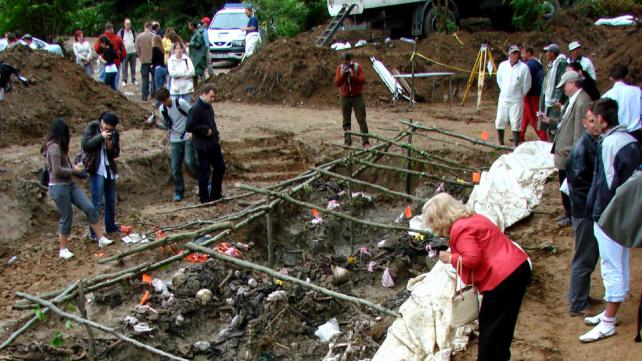
Srebrenica, Bosnia was the world's first United Nations Safe Area. In other words, it was a place where, regardless of the civil war and bloodshed occurring around the vicinity, civilians were to be protected by the UN's troops.
Srebrenica's status and the safe area policy were established in the spring of 1993. That was when Serb soldiers almost lay siege to the city. The United Nations and America, in particular, feared there would be a bloodbath once the Serbs took over. This was why the town was declared a safe area. Five other towns and cities in Bosnia were given this status: Zepa, Gorazde, Tuzla, Sarajevo, and Bihac in northwestern Bosnia.
Although the UN Secretary General at the time, Boutros Boutros Ghali, had demanded thousands of soldiers, Srebrenica was protected by about 600 primarily Dutch army officers.
Between July 6 and 8, 1995, Serb forces again lay siege to the town and began shelling. Thousands of civilians were already in Srebrenica after fleeing from other attacks by Serbs.
The next day, an estimated 23,000 Muslim women and children were separated from their husbands, fathers, grandfathers, brothers, sons and uncles and were forced to march towards another city. The Serbs kept the men, starting from age 12 onwards for "interrogation"
And then the massacre began. Current estimates say that over 8,000 Muslim men were executed in fields, schools and warehouses.
The UN peacekeepers handed over close to 5,000 Muslims who had sought protection at a Dutch base in return for 14 Dutch peacekeepers.
Until the revelation of video evidence on June 1, 2005 at the trial of Slobodan Milosevic at the International Criminal Tribunal for the former Yugoslavia, Serbia denied that forces from Serbia proper had taken part in the atrocities of the Bosnian civil war between 1992 and 1995. The video showed Serbian paramilitary police murdering unarmed Muslims from Srebrenica.
The irony of Srebrenica is that it was the worst case of genocide in Europe since World War II in the first area ever declared a safe area by an international organization.
In November 1999, the UN released a report on its role in Srebrenica and said this: "Through error, misjudgment and the inability to recognize the scope of evil confronting us, we failed to do our part to save the people of Srebrenica from the Serb campaign of mass murder." After that report was released, Bosnia's U-N ambassador, Muhammad Sacirbey, praised it, saying it took courage for the UN leadership to admit its mistakes.
In March 2003, thousands of people attended a mass funeral in Srebrenica for the victims of the town's massacre. The 600 men who were buried were the first to be identified from remains gathered from more than 60 mass graves. The ceremony was conducted by Bosnia's top Mufti, Mustafa Ceric. He called for justice, but urged the families of the victims not to seek revenge for Srebrenica's massacre.
Radovan Karadzic and Ratko Mladic, the two men indicted as the main architects of the Srebrenica massacre, remain at large.
Why is Srebrenica important? Why should we remember?
For the same reasons we must never forget the Holocaust, genocide in Rwanda or the killing fields of Cambodia: so that none of us ever forget the scale of human cruelty and injustice; so that perhaps we can still learn how to prevent barbarity before it reaches the level it has in Bosnia, Germany, Gujurat and Sudan; so that we stop the first stage of genocide: demonization of a people, whether it is Islamophobia, anti-Semitism or the any other kind of hatred bred by humankind's most evil propagandists.
We have lost our towns, our homes and everything we owned. We have the right to know the truth, to seek our children, our fathers, our husbands and our brothers!We shall look for them to the limit of our strength!" – a Srebrenica survivor.
The Serbs were upon wiping out the Bosniaks, the last genuine European Muslims. The Serbs believed that they were doing the other Europeans, all Christians, a favor. Bosniaks must be killed so they may reproduce no more. The women who were left alive were to be raped.
Ten years have passed and still hundreds of thousands of survivors are "displaced persons," many living in dire poverty. The passage of time has not diminished their ardent wish to return to their homes. However, return is largely obstructed by many of the people who hold power in their regions and are obligated to ensure their safety, but may well be those involved in the atrocities.
Ten years have passed about only some of the dead have been identified.
Ten years have passed and, although the International Criminal Tribunal for the former Yugoslavia (ICTY) has sentenced some people and is holding some others for trial, most of the war crimes suspects, including those charged with the highest criminal responsibility, are still free.
Under ordinary criminal law, a witness to a murder, unless he is restrained, is an accessory to the crime. As the world was witness to the massacre of the Serbs must regard the Bosnia's and the world, as am accessory to the crime that constituted ethnic cleansing. If we accept the legacy of these gross human rights abuses in Europe, we thereby deny the most precious foundations of our civilization.
The United Nations has admitted responsibility for the fate of Srebrenica. We now call upon the UN and its member states to face the consequences of that responsibility.
To the Secretary General of the UN, the heads of government of the states concerned and other UN member states, we address an appeal for serious, urgent and effective action:
To reveal the whole truth concerning the fall of Srebrenica, to identify all those who were responsible, either actively or complicity, for this tragedy and to identify victims.
To arrest and bring to trial all suspects indicted by the International Criminal Tribunal for the former Yugoslavia (ICTY) according to its mandate, this putting an end to impunity.
To lay the foundations for a Bosnia-Herzegovina, which respects and promotes human rights for all its citizens without distinction.
Photo Attribution: http://commons.wikimedia.org/wiki/File:Srebrenica_Massacre_-_Mass_Gravesite_-_Potocari_2007.jpg

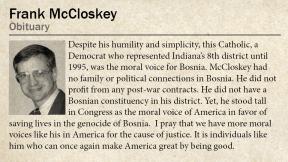
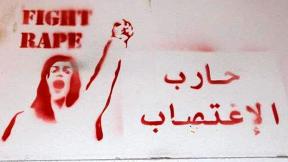
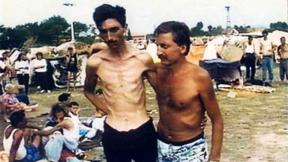
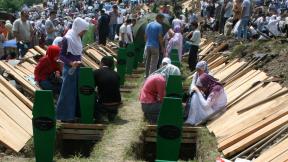
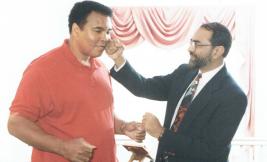


Comments
genocide against Bangladeshi in 1971
UN is always unable to protect the innocent from murder or mass killing. It is our bad luck, we unable to make a world org which will maintain peace. we must need to understand the role of UN in 1971 when Pakistani occupied force attacked on the Bangladeshi mass people, that time UN not taken proper initiative against Pakistan or his supporter.
Location
can we go back in a few years before the massacre to see how muslims landed themselves in this situation? Did they do something wrong to deserve this fate ? Was there no "elder" or wise person who could foresee that this was coming. The kettle usually whistles before it boils over. PLEASE we must know this so people can prepare themselves not only there but everywhere in the world. Defense and preparation to defend oneself is encouraged in Islam. So why did the muslims DEPEND on others for their defense, which obviously never came. Did the Bosnians expect otherwise ? If they did, that's their fault for trusting others.
Location
Add new comment